Helping teenagers with literacy
10 Replies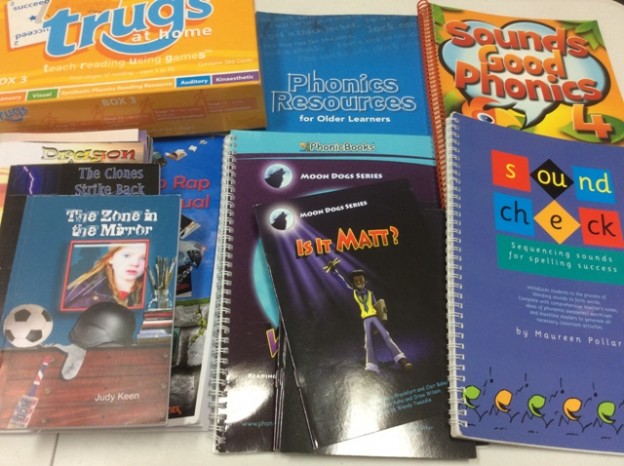
The other day our state Education Minister announced $72.3 million extra dollars will be spent over four years helping struggling secondary students, specifically kids who haven’t met Year 5 NAPLAN benchmarks.
Woo hoo to that, I say. But if it’s spent on doing the same sorts of things that didn’t work in primary school, it will be a waste.
Secondary school students with poor decoding skills and very little ability to spell generally need a good initial blast of synthetic phonics to build their awareness of sounds in words and knowledge of spelling patterns, followed up by work on vocabulary, comprehension and fluency. I’ve been doing this type of work for 14 years, in conjunction with the world’s most fabulous integration teacher and aides. We’re yet to find someone we can’t teach to read, including students with intellectual disability, language disorder and English as a second or third language.
Here’s roughly what I’d do and buy if I were a decision-maker in a secondary school with a number of students who have encoding/decoding difficulties.
Predictable or repetitive texts
6 Replies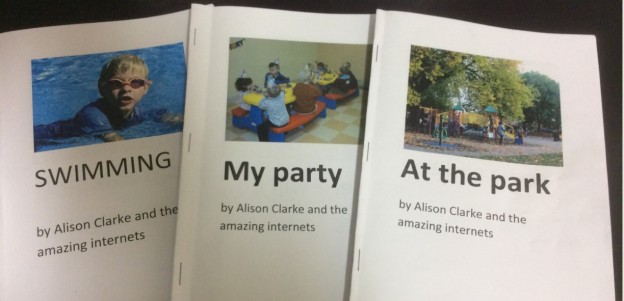
I've made a new video about predictable texts, sometimes called repetitive texts.
These are short books typically given to little kids when they first start school, and which they take home to read with their parents.
Each page usually contains a sentence and a picture. The same sentence frame repeats on each page, with just one or two words changed to reflect the new picture.
Children often "read" these books by guessing from pictures, first letters and context, i.e. they engage in reading-like behaviour, but they're not actually reading. Often it's only when texts get more complex that adults notice that they can't actually decode.
Let's have a look at some example repetitive, predictable texts, and compare their spelling patterns and syllable structures with decodable texts, and see what they look like to a beginning reader.
If you get this blog post by email and the embedded video below has dropped out, click here to view it online.
To find a list of decodable books, click here.
Sound Out Chapter Books
5 Replies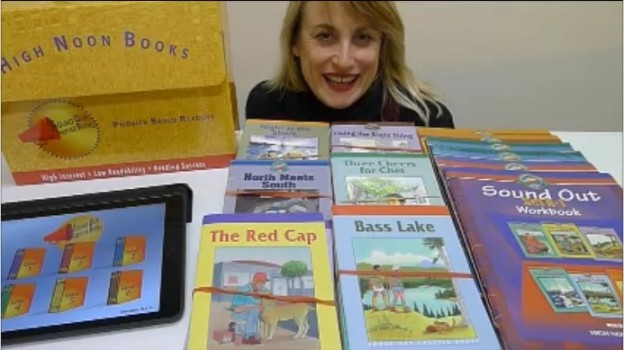
I've been using and recommending High Noon Books' Sound Out Chapter Books since before I started this blog, but recently 18 of them became available as an iPad app, so I decided it was High Time to show you them on video.
The Sound Out Chapter Books are decodable (simplified text) books for older, struggling readers. Most of the stories are about teenagers or young adults, and I've also used them with a few upper primary students.
They're mostly interesting-enough stories, insofar as it's possible to write such a thing using a restricted set of spellings, and there are a couple that my students have wanted to keep reading, to find out what happens, even after the lesson ended.
Cheap decodable books – Pocket Rockets
3 Replies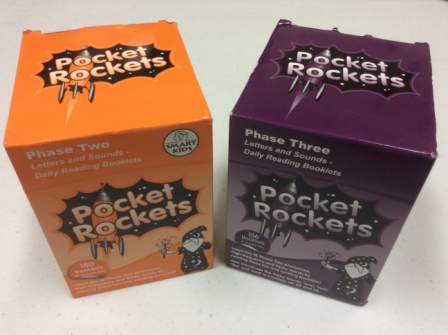
Most of the books my local schools give beginners to read are of the repetitive, look-at-the-picture-and-guess variety. They contain a large, random selection of sound-letter correspondences, and often long words and hard spellings.
There’s no way beginners can sound many or even most of these words out, and schools typically have few or no decodable books, which strip back this complexity and provide children with focussed opportunities to practice the sounds and spellings they’ve been taught. Crazy, eh? But there it is.
Class teachers often don’t get to choose the books available, and don’t have a budget to buy decodable books. They must either use the too-hard books or (if they are determined to teach in accordance with the best scientific evidence) get free or cheap decodable books that reflect their teaching sequence. Free ones are great but involve downloading, printing and binding them oneself, which is time-consuming, and it’s hard to get a professional-looking result.
One teacher’s early literacy epiphany
6 Replies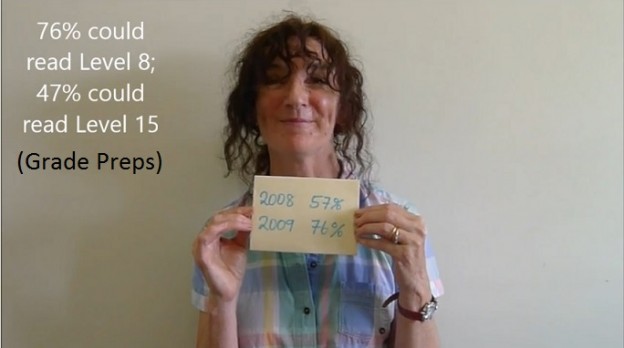
I recently met an experienced Melbourne primary teacher, Berys Dixon, who told me the delightful story of how she came to be an advocate of explicit, systematic, synthetic phonics.
Returning to work after raising her family, she was instructed to use a multiple-cues, guided reading approach with her class of five-year-olds. Many spoke a language other than English at home, and the school was in a low socioeconomic area.
One day, a parent complained that her child couldn’t sound out the words in his home reader. Berys advised the parent not to expect the child to sound out, but to encourage him to look at the picture, read ahead, have a guess etc. Then if he still couldn’t get the word, just read it for him.
Berys realised that what she had just said made no sense. She went home and started googling.
Rather than me paraphrasing the rest of Berys’s lovely story, which has a very happy ending, please take five minutes to listen to her telling it herself.
Because we’re all humans, we tend to understand and believe the personal stories other people tell us more than we understand and believe data and graphs.
I hope that Berys’s story (which is consistent with the very best data and graphs) will help persuade teachers of beginners and young strugglers to include explicit, systematic synthetic phonics in their literacy curriculum.
If her super-affordable and funny Pocket Rockets make that more possible, great. Each child’s set can be stored in a little photo album from the $2 shop, making them durable yet very small and lightweight for young children’s (often heavy and full) school bags.
The teaching sequence these booklets follow is from the UK government’s Letters And Sounds program. There are many free teaching resources for this program available online, click here, here and here for examples. Or just start googling, like Berys!
Update April 2019: Berys now has a website and her books are available in larger size and parent packs. I’ve also made a free downloadable beginners’ workbook following the same teaching sequence as her books, which you can print and use with the first set of her books (phase 2, the orange ones).
Books need to make sense
0 Replies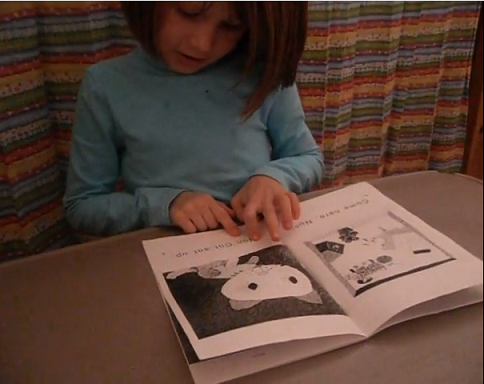
After yesterday posting a video of myself assisting a beginner to read a simple decodable book, I went looking for similar videos by others. Surely there must be lots of good ones out there on the amazing internets, right?
Well, it was slim pickings, and much of what I found was rather cringeworthy. People showing off their overachieving preschoolers, people teaching in a dull, didactic way and children memorising and reciting books or looking at pictures, first letters and guessing. Perhaps I am not searching correctly, please someone tell me if I'm not.
I found one interesting, 2010 homemade video of a great little kid called Kaylee reading a couple of decodable books to an adult, presumably her mother. They clearly had a nice relationship, and were on the right track from a decoding point of view.
Here's the video, I hope you will just watch Kaylee reading the first book (the first two-and-a-half minutes) and then read on.
Teaching beginning reading
3 Replies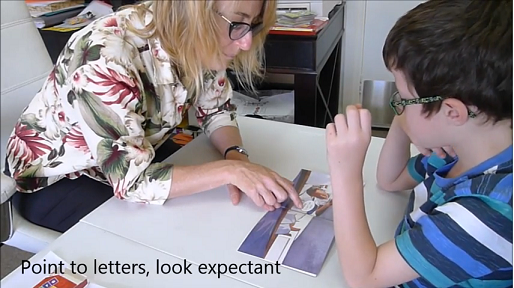
Here’s another video demonstration, this time of strategies to help a child successfully read a short, simple book.
The book contains only little words this child can sound out, plus a few common words of which he already has mental images, like “I” and “you” and “see”.
There are many simple, decodable books like the one in this video available, if you know where to look. Click here for a list. Many are also quickly (and often very affordably) available for iPad/tablet or other computers, as apps or electronic books.
Profuse thanks once again to this delightful student and his parents for allowing me to record and share this video.
Of course, as soon as I watched this video I started thinking of all the things I should/could have done better in this session.
Oh well, nobody’s perfect, and I hope it’s still useful.


